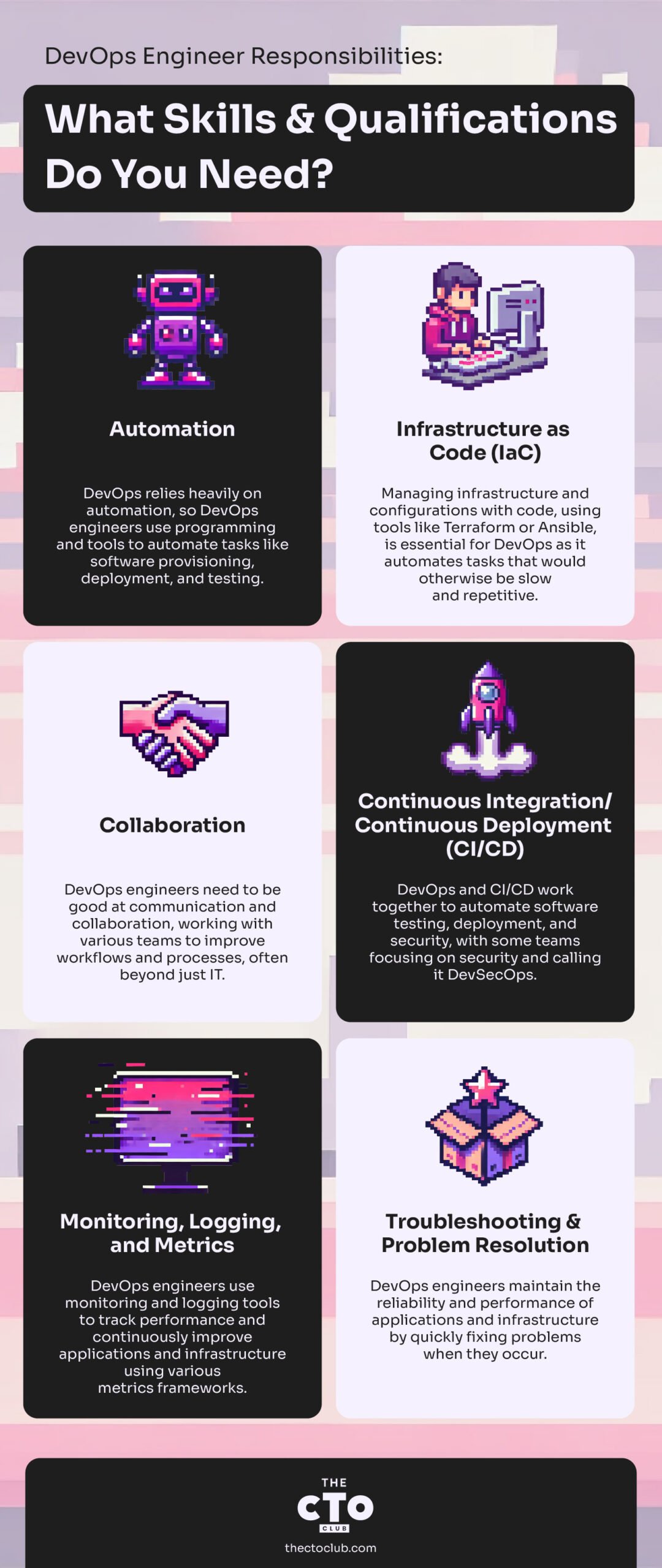A recent U.S.-wide search for “DevOps Engineer” on the tech jobs site Dice returned 4,474 open positions. Not bad for a job title that didn’t exist a decade ago.
DevOps engineer roles – like the DevOps discipline itself – have grown immensely in recent years to the point where they’re commonplace. But almost from its inception, the job – and the title itself – sparked some confusion. What, exactly, does a DevOps Engineer do?
(If you answered “DevOps,” you’re not doing much to clarify the issue.)
A DevOps engineer is a professional who works to bridge the gap between software development and IT operations, with the goal of improving the efficiency and effectiveness of software development and deployment processes,” says Cara Suarez, head of product marketing at mobile testing platform Kobiton.
That makes it a multidisciplinary role, Suarez notes – one that’s increasingly indispensable in many enterprises.
“A DevOps engineer plays a crucial role in modern software development and IT operations, focusing on automation, collaboration, and a culture of continuous improvement,” Suarez says. “The role is evolving to address new technologies and security challenges, and a diverse skill set is essential for success in this field.”
In this article, we’ll define the DevOps engineer role, what skills are required of it, and how the job is changing in 2025 and beyond.
Defining DevOps: Beyond the Buzzword
To better understand the DevOps engineer role, it, of course, helps to understand DevOps itself.
In brief, DevOps is a set of practices, processes, and tools aimed at bringing two critical IT functions – software development (“Dev”) and IT Operations (“Ops”) – into much closer alignment than was typical in the past. While the specific goals of doing so can vary by organization or team, the overarching purpose is to improve the speed, frequency, resiliency, and security of software development, deployment, performance, and maintenance.
When successful, DevOps teams can build and ship code faster and more frequently, with fewer errors, less downtime, and a healthier work environment. That makes it valuable for companies across any industry and size, from DevOps startups to Fortune 500 firms.
Holistic DevOps definitions also typically emphasize the importance of people – how they communicate, how they work together, how they can spend less time on repetitive manual effort, and so forth. As a result, DevOps is often thought of as much (or more so) as a culture as a technical or process-oriented discipline. It’s as much about building better products and services with shared incentives, blameless work culture, and streamlined software delivery – without burning your team out.
“As DevOps has matured, it has expanded beyond just automation and collaboration,” Suarez says. “It now encompasses a broader cultural shift, often referred to as ‘DevOps culture,’ emphasizing a mindset of continuous improvement and collaboration across the entire organization.”
What Do DevOps Engineers Do?
As DevOps proliferated in enterprise IT, there was a recognition that the close alignment of development and operations teams – that had typically worked in separate, siloed fashion in the past – created the need for a new class of IT pros with skills and responsibilities that bridged multiple functions.
The role of a DevOps engineer emerged to address the challenges associated with traditional software development and IT operations, where these two functions often worked in isolation, leading to slow, error-prone, and inefficient processes.
Derek Ashmore, Application Transformation Principal at Asperitas, describes the role in straightforward terms: “A DevOps engineer uses automation for a wide variety of IT tasks that used to be done manually.”
Those tasks include a wide variety of IT functions, such as deploying and managing application environments, application code deployments, server software, security policies, cloud infrastructure, and much more, according to Ashmore.
Because of the diversity of those tasks and the skills they require, some DevOps engineers specialize in particular domains, even if they share a common title.
It is common for some to specialize in server software management and configuration as those require system administration skills. Others concentrate on application builds and continuous delivery, often involving programming language-specific skills.
Put another way: DevOps engineers are increasingly responsible for the behind-the-scenes work required to build, deploy, manage, and secure great software.
DevOps Engineer Skills & Qualifications
While specialization can dictate specific skills and experience, the DevOps engineer role has typically coalesced around some common “hard” skills (such as technical skills) and “soft” skills (such as interpersonal communication or team-building).

Suarez from Kobiton breaks them down as follows:
- Automation: While DevOps is not merely a synonym for automation, there is almost no such thing as a DevOps environment that runs largely or entirely on manual effort and processes. Automation is embedded in the DNA of DevOps. As a result, DevOps engineers are typically responsible for using various programming languages and other tools to create and maintain automated processes for software provisioning, deployment software, and testing, among other fundamentals of the software development lifecycle.
- Infrastructure as Code (IaC): Speaking of which, managing infrastructure and configurations using code, often using tools like Terraform or Ansible, is an automation category unto itself – one indispensable to DevOps pipelines and processes. Manually configuring (reconfiguring) application and infrastructure environments – especially at scale – runs antithetical to the general principles of DevOps, for example. DevOps engineers are increasingly responsible for automating much of that repetitive effort away for speed and efficiency.
- Collaboration: DevOps engineers can’t usually reinforce the bygone stereotype of the grumpy IT pro locked away in a server closet somewhere. They must be comfortable facilitating DevOps best practices and collaboration and communication between development and operations teams to streamline workflows and processes. In large organizations where DevOps principles take root and spread into other functions – such as security and DevSecOps – or non-technical departments, they need to be able to work with an even more diverse set of personalities and job functions.
- Continuous Integration/Continuous Deployment (CI/CD): DevOps and CI/CD go hand-in-hand, especially since both rely heavily on automation to facilitate increased velocity, frequency, and efficiency. DevOps engineers are often responsible for implementing and managing CI/CD pipelines to automate software testing and deployment, as well as helping automate vulnerability scanning and other security checks in those pipelines as early as possible. DevOps teams that place a particular emphasis on security sometimes use the related moniker “DevSecOps” to reflect that security is treated with the same priority as software development and operations.
- Monitoring, Logging, and Metrics: DevOps engineers also set up monitoring and logging tools to track the health and performance of applications and infrastructure. In general, DevOps engineers and the broader teams they are part of are heavily invested in measuring the performance of their efforts, in part to build and reinforce a mindset of continuous improvement and optimization. Different teams use a variety of frameworks for DevOps metrics.
- Troubleshooting & Problem Resolution: DevOps engineers ensure the reliability, resiliency, and availability of the applications and infrastructure they support. As a result, their jobs typically include troubleshooting and mitigating performance problems and other issues as they arise.
Tools and Programs for DevOps Engineers
While there is no standard, one-size-fits-all list of DevOps tools, DevOps teams typically standardize on a toolchain of their own choosing. That toolchain usually maps to the fundamental skills we covered above. Here are examples of some popular DevOps tools for each category (with assistance from Suarez):
- Automation/Infrastructure-as-Code: Ansible, Terraform
- Containerization & Orchestration: Docker, Kubernetes
- Cloud Infrastructure & Services: Amazon/AWS, Microsoft Azure, Google Cloud Platform
- CI/CD Pipelines & Tools: Jenkins, GitLab CI/CD, Travis CI
- Version Control: Git
- Monitoring & Logging: Prometheus, Grafana, ELK stack (Elasticsearch, Logstash, Kibana).
- Scripting Languages: Bash, Python
- Operating Systems: Linux
Keep in mind that experience with interest in open source software and tools is also a big plus. Several of the big names above (like Linux and Kubernetes) fit the bill, and many platforms and tools in the cloud and cloud-native ecosystem are either open source or based on open source code.
It’s also important to note that DevOps engineering skills – like software engineering skills in general – aren’t static or fixed in time. The principles may stay relatively constant, but practices, tools, and languages can come and go. Suarez points to serverless computing – and tools such as AWS Lambda and Azure Functions may start appearing more often on DevOps engineer hiring wishlists. Similarly, Suarez sees more organizations intentionally building DevOps practices specifically around mobile development and testing.
How to Become a DevOps Engineer: Education, Experience, & Certifications
So, you wanna be a DevOps engineer?
It’s certainly an in-demand DevOps role with plenty of growth opportunities. Given the breadth and scale of the technologies and processes it interacts with, it’s a great field for continuous professional development.
For many, a DevOps engineer role is a stepping stone toward higher leadership positions, like becoming a CTO, where technology and strategic decision-making merge. For companies not ready for a full-time CTO, there’s also the option of hiring a fractional CTO—a part-time or contract CTO who provides strategic guidance and expertise, helping bridge the gap between DevOps engineering and executive leadership.
There’s no single pathway to the DevOps engineer role. While some employers might have specific requirements such as a computer science degree – a requirement that often sparks heated debate in the IT profession – the reality is that multiple educational and professional tracks can produce the skills and experience required of a DevOps engineer.
Some other common IT roles that overlap with DevOps engineering qualifications include:
- Systems Administration
- Software Engineering
- Site Reliability Engineering
- IT Operations
- Infrastructure Engineering / Cloud Engineering
There’s an emerging class of DevOps-oriented certifications as well. Some of these – like the Certified Kubernetes Administrator and AWS Certified DevOps Professional – are tied to specific platforms, so it’s a good idea to have a sense of your target employers and what environments and tools they use. Better yet, see if your current employer will sponsor you. (CTOs, take note: Offering professional development is a great hiring and retention practice.)
Online courses, meetups, and experimenting in a home lab are also great ways to learn and build skills with hands-on practice. Focus on the must-have stuff first – think automation, cloud, and open source, for example.
The Bottom Line
DevOps engineers play a significant role in how modern software gets built, deployed, managed, and secured. Be sure to join The CTO Club newsletter for more industry news and discussions, too!


